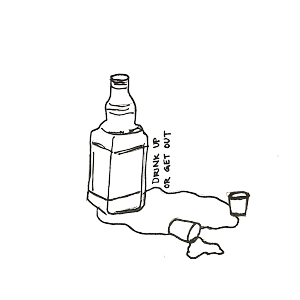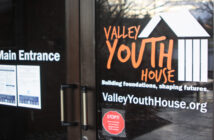On college campuses across the country, hazing has taken on a dark form where joining an organization, in some cases — whether it be Greek, athletic, musical or otherwise — may require the participation in dangerous, life-threatening tasks.

Illustrated by Liz Cornell
Based on the results from a 2012 campus-wide survey on hazing perceptions, 75.2 percent of students believe that hazing-related activities occur at Lehigh and 62 percent said that they have actually witnessed hazing.
“You would be in denial to say that hazing isn’t a problem here,” said Matthew Bay, ’16, Interfraternity Council president and member of Phi Sigma Kappa.
In fact, the two most common hazing activities that students believe to occur at Lehigh are forced alcohol and/or drug consumption and forced social attendance, according to the survey.
As one of eight colleges to join the national Hazing Prevention Consortium, a three-year research initiative to develop effective hazing prevention strategies, Lehigh is actively trying to address the issue of hazing on campus.
This fall, Lehigh’s local hazing prevention coalition launched a new hazing prevention website to serve as a resource to students, and also released a campus-wide hazing prevention statement.
According to Allison Gulati, the associate dean of students and director of strategic initiatives and coalition chair, the group has been working to increase the amount of training that happens for students. She said it’s clear that there is still a lot of work to be done.
While survey results showed that 75.2 percent of students believe hazing occurs at Lehigh, only 26.4 percent said that they believe hazing to be a considerable issue.
This disparity between perception and reality may be due to the word that often comes up in conversations about hazing: tradition.
“Lehigh is an institution that greatly values its traditions,” Gulati said. “Sometimes those are positive and sometimes they are very negative.”
In the case of hazing, she said, all traditions are negative. Several organizations believe that certain rituals can be justified as a “rite of passage,” and Gulati said students often claim, “I went through it, so they should too.”
Gulati said some students even openly say that they want to be hazed, since they want to feel like they deserve to be in the group.
According to Christopher Mulvihill, assistant dean of students, the roots of hazing come from the inherent hierarchical nature of groups and organizations and the uneven distribution of power.
“In all groups, you have those who are ‘in’ and those who are ‘out,’” Mulvihill said. “For Greeks, it’s the pledges. For athletes, it’s the rookies. And for music groups, it’s the new guys.”
He explained that any time there is a group that is selective in nature, like those on college campuses, hazing could occur. Students who are “in” find a lot of value in their group and try to protect that by making it harder for newcomers to join.
Rob Hillman, a Marching 97 member and a student member of the hazing coalition, recalls his experience over the past few years and can relate to Mulvihill’s idea of group hierarchy.
The Marching 97, he explained, has a long history of hazing at Lehigh. When he first joined the band, a lot of that hazing tradition still existed, but he said he has witnessed the organization work to cut back on this over the past couple of years.
“If you’re trying to hide behind hazing by calling it a tradition, then you need to re-evaluate,” Hillman said. “I know the 97 is, but I’d like to think that other people in my generation are adult enough to know that there isn’t room for this.”
From his own experiences, he has seen the Marching 97 reconsider their dangerous traditions, such as forced alcohol consumption and think of alternative ways to accomplish its goals.
Hillman said now it is common for new members of certain instrumental groups to hang out and participate in “typical fun” activities, such as bowling or creating t-shirts.
For other groups who haven’t been as willing to re-evaluate hazing rituals, Gulati warns that one of the most dangerous aspects of hazing is that there are so many hidden ramifications.
She explained how it is impossible to know what is going on in everyone’s personal lives and hazing can have different effects on each individual.
“Yelling at one person may be completely different than yelling at another,” Gulati said. “What may seem minor may have a hugely negative consequence for someone since everyone has different reactions.”
According to Elizabeth Shayler, assistant director for fraternity and sorority affairs and head liaison for the coalition, one of the biggest obstacles in preventing hazing at Lehigh, or on any college campus, is the issue of honesty. Students are often unwilling to tell the truth to administrators about hazing, since they don’t want to risk the status of their organization.
“It’s hard because we care so much about the well being of our students, but we can’t help change anything if they aren’t honest about what’s going on,” Shayler said.
Despite hazing is still prevalent on campus, students agree that Lehigh is moving in the right direction.
“One of the main goals of the coalition is to educate as many people as possible about hazing,” Hillman said. “The one way we think we can make it go away is for everyone to know that hazing is a real problem, and that there are ways it can be prevented.”
However, the ultimate eradication of hazing depends on the organizations themselves. Any group with a hazing problem needs to go the few extra steps to re-evaluate, Hillman said.
But there’s a problem with that, according to Shayler. She said there is a lack of desire among organizations to seek out alternatives and think beyond traditions.
“We can’t stop the cycle unless students are willing and want to break down traditions and re-build them in a constructive way,” she said.





Comment policy
Comments posted to The Brown and White website are reviewed by a moderator before being approved. Incendiary speech or harassing language, including comments targeted at individuals, may be deemed unacceptable and not published. Spam and other soliciting will also be declined.
The Brown and White also reserves the right to not publish entirely anonymous comments.
1 Comment
I agree students play a role in the degree which hazing occurs so commonly at Lehigh. Students regret the hazing but it seems to be sadly accepted.
The administration is responsible for their student’s safety and they must uphold the law. Hazing is illegal in 44 states and Pennsylvania is one of the 44 where it is illegal. It is accurate students should not be bystanders to the hazing, but it is the Administrators who must protect the students and make sure laws are followed by their students.
If a parent can read blogs, news paper and police reports of the frequent hazing events at Lehigh, so can the Administrators! Their job as the Administration is to prevent risky, degrading and unsafe situations from occurring. Protect the students. Hazing and widespread serving (over serving) alcohol to Lehigh minors is happening too frequently this year to seriously believe that our student’s mental and physical well being is placed above the dangerous and protected traditions of Lehigh’s Greek life.